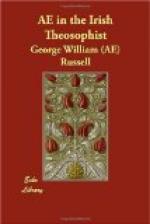“Who are you down there in the darkness who sigh so? Are you all alone there? For so many years! Ah, poor man! I would come down to you if I could, but I will sit here and talk to you for a while. Here are flowers for you,” and a little arm showered them in handfuls; the room was full of the intoxicating fragrance of summer. Day after day the child came, and the dull heart entered into human love once more.
At twilight, by a deep and wide river, sat an old woman alone, dreamy, and full of memories. The lights of the swift passing boats, and the lights of the stars, were just as in childhood and the old love-time. Old, feeble, it was time for her to hurry away from the place which changed not with her sorrow.
“Do you see our old neighbour there?” said Ayesha to her lover. “They say she once was as beautiful as you would make me think I am now. How lonely she must be! Let us come near and speak to her”; and the lover went gladly. Though they spoke to each other rather than to her, yet something of the past—which never dies when love, the immortal, has pervaded it—rose up again as she heard their voices. She smiled, thinking of years of burning beauty.
A teacher, accompanied by his chelas, was passing by the wayside where a leper was sitting. The teacher said, “Here is our brother whom we may not touch. But he need not be shut out from truth. We may sit down where he can listen.” He sat down on the wayside beside the leper, and his chelas stood around him. He spoke words full of love, kindliness, and pity, the eternal truths which make the soul grow full of sweetness and youth. A small old spot began to glow in the heart of the leper, and the tears ran down his withered cheeks.
All these were the deeds of Parvati, the ascetic; and the Watcher who was over him from all eternity made a great stride towards that soul.
—November 15, 1893
A Talk by the Euphrates
Priest Merodach walked with me at evening along the banks of the great river.
“You feel despondent now,” he said, “but this was inevitable. You looked for a result equal to your inspiration. You must learn to be content with that alone. Finally an inspiration will come for every moment, and in every action a divine fire reveal itself.”
“I feel hopeless now. Why is this? Wish and will are not less strong than before.”
“Because you looked for a result beyond yourself, and, attached to external things, your mind drew to itself subtle essences of earth which clouded it. But there is more in it than that. Nature has a rhythm, and that part of us which is compounded of her elements shares in it. You were taught that nature is for ever becoming: the first emanation in the great deep is wisdom: wisdom changes into desire, and an unutterable yearning to go outward darkens the primeval beauty. Lastly, the elements




